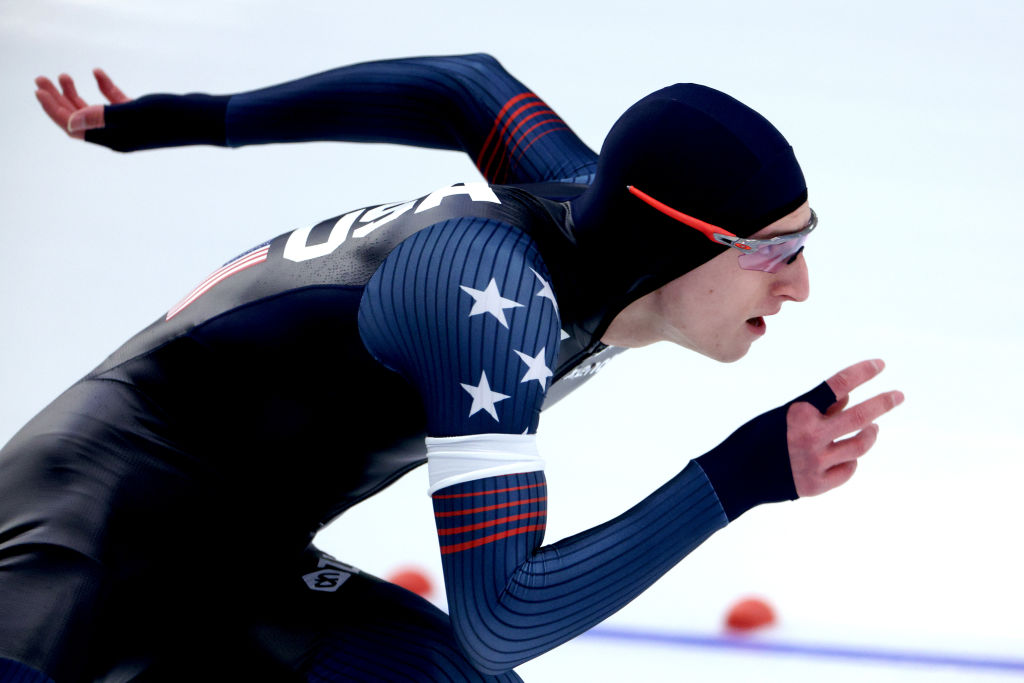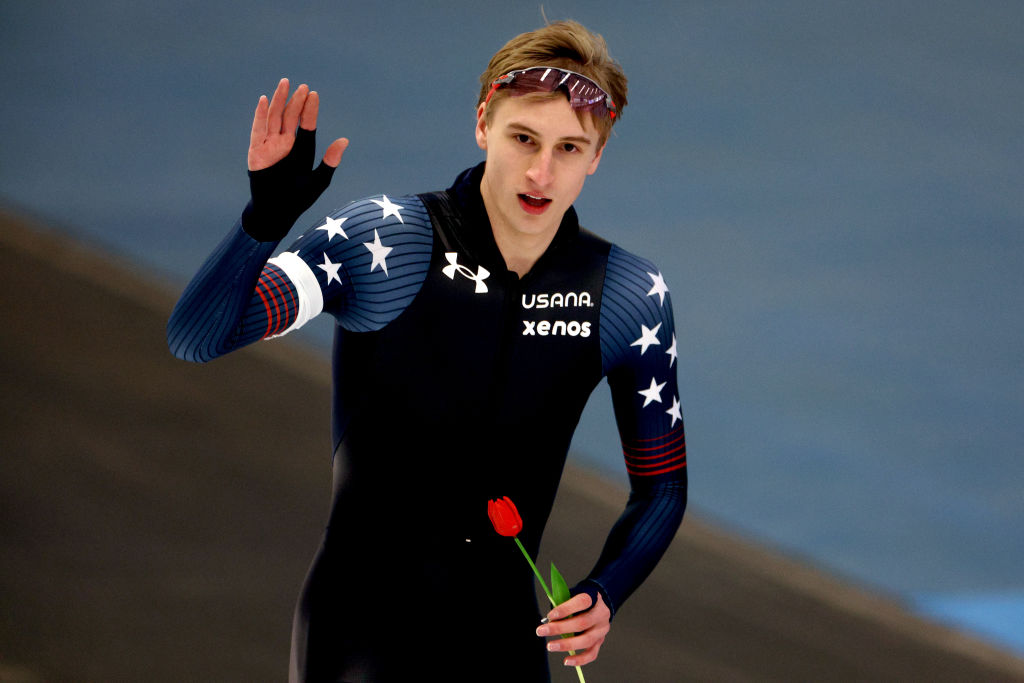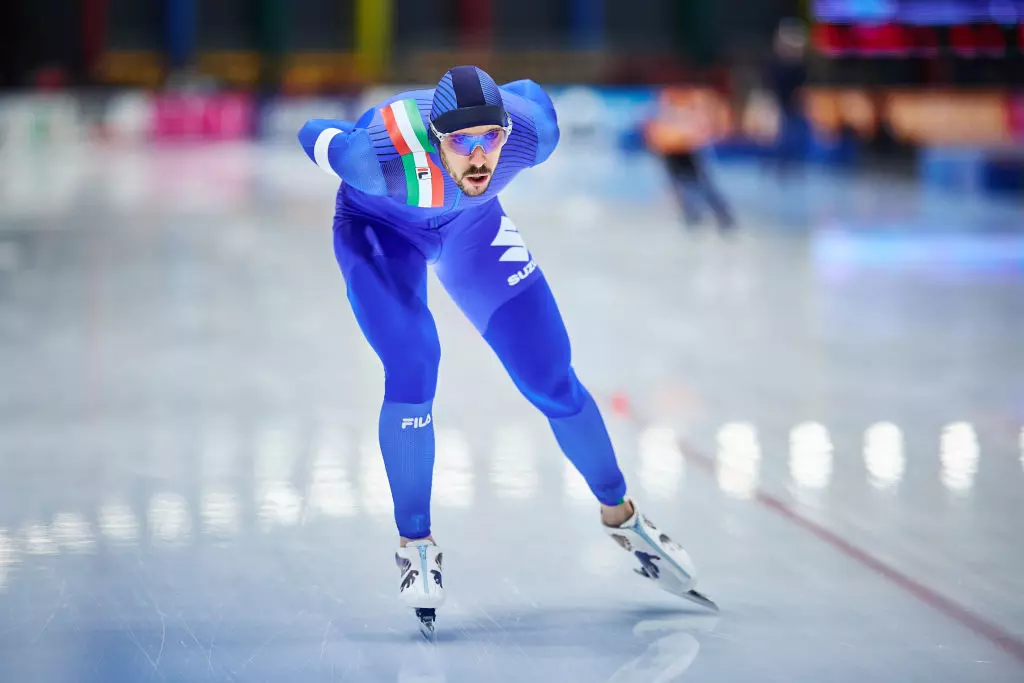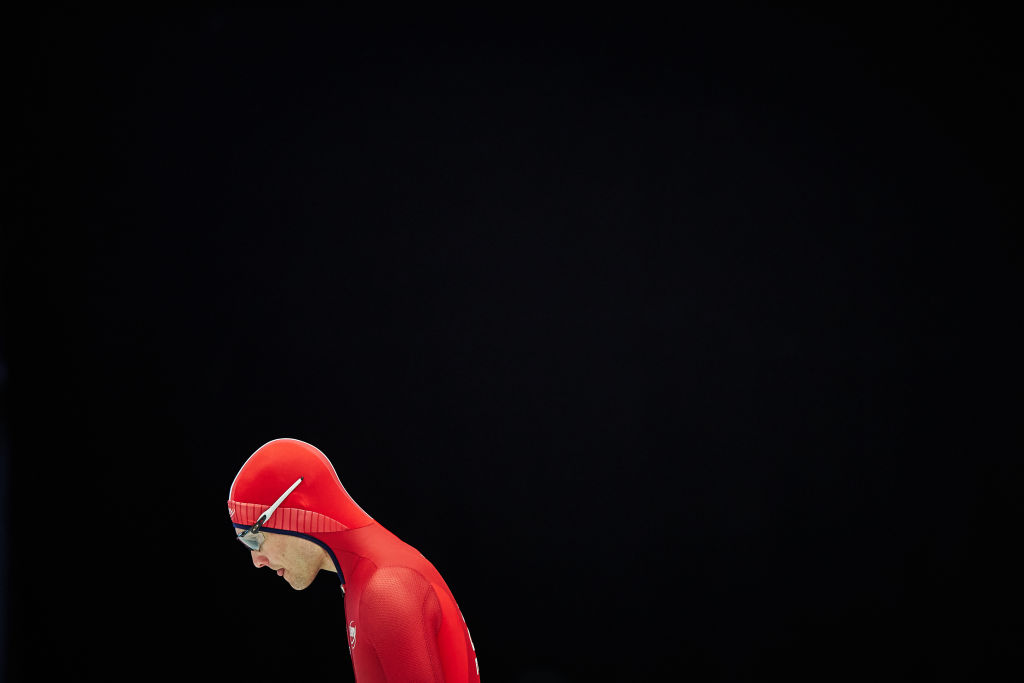
Jordan Stolz (USA) in the Men’s AllRound at the ISU World Speed Skating Sprint Championships in Inzell, Germany © ISU
Before the men’s ISU World Allround Championships, many people were calculating chances, measuring the speed of Jordan Stolz (USA) against the stamina of Patrick Roest (NED). It took Stolz only 34.10s to end all speculation. Even Roest agreed that Stolz was the outright favorite for the Allround title after the American youngster smashed the 500m track record and kept his composure with a time of 6 minutes and 14.76s in the 5000m on the first day. Before the start of Sunday’s 1500m, second-ranked Roest is 3.42s behind. Sverre Lunde Pedersen (NOR) follows at 6.36s in third place.
Stolz draws first blood
The fastest time at the ISU World Sprint Championships on Thursday and Friday had been 34.27s by Jenning de Boo (NED), but Jordan Stolz (USA) is from a different speed skating planet. The 500m, 1000m and 1500m World Champion crushed the track record set by Pavel Kulizhnikov (RUS) in 2019, by .12s to take a massive lead over threefold champion Patrick Roest (NED), who finished the shortest distance in 36.06s to come fourth. The 1.96s difference in the shortest distance translated to a 19.6s gap in the 5000m later on Saturday afternoon.
Shomu Sasaki (JPN) took silver in the 500m in a personal best of 35.43s, and his compatriot Riku Tsuchiya (JPN) got bronze, also in a personal best of 35.83s.
Sverre Lunde Pedersen (NOR) started the final championships of his career in 36.24s for eight place in the 500m. The 31-year-old Norwegian, who has five world allround podium spots to his name, but has never won the tournament, has decided to quit speed skating after the Inzell championships.
Well-balanced 5000m
Despite his comfortable lead over main rival Roest, Stolz didn’t take anything for granted in the 5000m. The American set out to break his own personal best of 6:20.76, and skated at an incredibly even pace. Except for two 30s laps in the beginning of his race, the 19-year-old American only skated laps between 29.38s and 29.77s to finish exactly six seconds faster than his personal best of 6:20.76, with a time of 6:14:76.

Jordan Stolz (USA) in Inzell, Germany © ISU
“I knew it would be between 6:13 and 6:15,” Stolz said after the race. He made it look easy, but looking forward to Sunday’s 1500m and 10.000m, he admitted that the long distances were very difficult.
“I think I’ll be tired from today, it hurt pretty bad, but maybe I’ll skate a bit faster than expected based on how today went.”
Stolz was happy to have a 1.139 point lead over Roest, and he hopes to be able to gain a little more time in the 1500m.
“If I can get (a margin of) 1.3 points, that will give me 26 seconds (in the 10,000m). I think that will give me enough. I think I can skate a 13:10.”
Ghiotto sets track record
Roest took on his arch rival Davide Ghiotto (ITA) in the penultimate pairing of 5000m. While the Italian had beaten the Dutchman in the 10,000m at the World Single Distance Championships, the 5000m had been Roest’s domain so far.

Davide Ghiotto (ITA) competes in the 5000m Men AllRound at the ISU World Speed Skating Sprint Championships in Inzell, Germany © ISU
This time it was different. Ghiotto took off fast and Roest didn’t dare to counter. Eventually the Dutchman ignited the engines with three laps to go, but it was too little too late. Skating at track record pace, Ghiotto kept his rival at bay in the final laps to finish in 6:06.28, beating the 2019 track record set by Sverre Lunde Pedersen (NOR).
“Finally!” the Italian exclaimed after he beat his 5000m nemesis. “The feeling was very, very good. It’s hard, but my legs were good.
“After coming second in the 5000m (at the World Single Distance Championships in Calgary in February), for me it’s great to finally beat Patrick.”
In the Allround ranking it didn’t help Ghiotto too much, however. The Italian had lost too much with 37.52s in the 500m and was ranked ninth after the first two distances.
Ghiotto commented: “Before these World Championships I tried to skate a 37s 500m, and I did a 35.7s, but that’s not enough because the young guys are so strong. Since three years, ago the level has gone up a lot. Maybe there’s 10 people able to skate under 37s now.”
Pedersen’s last dance
In fact, the first 14 men in the Allround field managed to stay under 37s in the 500m. One of them was Pedersen, who came in eighth with 36.24s.

Sverre Lunde Pedersen (SWE) in the Men's Allround at the ISU World Speed Skating Sprint Championships in Inzell, Germany © ISU
The Norwegian followed up his strong 500m outing with 6:14.53 and sixth place in the 5000m, to climb up to third place in the ranking on Saturday afternoon. Despite losing the track record he set when he won the 5000m world title in 2019, Pedersen was a happy man.
“I had a really good day. I was really nervous and excited before this weekend and it got extra special when I saw Håvard (Håvard Lorentzen, NOR) waving farewell after the sprint tournament yesterday.
“I'm just happy to skate my best races of the season now. It was fun today. Actually I felt like a bit the same as my race in 2019.”
Looking forward to Sunday’s races Pedersen said:
“I have a good position now, but I have some strong Norwegians behind me so I'm just going to attack tomorrow as well and enjoy my last races.”
Hallgeir Engebråten (NOR) comes fourth after the first day and Sander Eitrem, who took third place in Saturday’s 5000m, is ranked fifth.
Speed Skating tradition
Although the single distance format tends to get more attention because it’s Olympic style, the long track Speed Skating championships were traditionally decided by racing multiple distance tournaments. The first ISU World Allround Speed Skating Championships were held in 1893, when Jaap Eden (NED) took the title in Amsterdam (NED). The first World Single Distances Championships were held over a century later in Hamar (NOR) in 1996.
In the traditional Allround format skaters a classification is made up after four distances. Men skate the 500m and the 5000m on the first day and the 1500m and the 10,000m on the second. The women’s distances are 500m, 3000m, 1500m and 5000m.
The World Sprint Championships were first held in 1970. In this format both the men and the women skate the 500m and the 1000m twice.
In Inzell (GER), the Sprint Championships are held on Thursday and Friday, and the Allround Championships are scheduled for Saturday and Sunday.
Samalog score
In both the Sprint and the Allround tournaments the final ranking is based on the so-called samalog score over four distances. The samalog system converts times into points, with the 500m as starting point. For a 500m race, the number of seconds counts as the number of points. For the 1000m the number of seconds is divided by two to calculate the number of points; for the 1500m it’s divided by three, for the 3000m by six, for the 5000m by 10 and for the 10,000m by 20.
Program:
Thursday 7 March 2024
19:00 - 1st 500m Women
19:00 - 1st 500m Men
19:00 - 1st 1000m Women
19:00 - 1st 1000m Men
Friday 8 March 2024
18:30 - 2nd 500m Women
18:30 - 2nd 500m Men
18:30 - 2nd 1000m Women
18:30 - 2nd 1000m Men
Saturday 9 March 2024
12:45 - 500m Women
12:45 - 500m Men
12:45 - 3000m Women
12:45 - 5000m Men
Sunday 10 March 2024
13:15 - 1500m Women
13:15 - 1500m Men
13:15 - 5000m Women
13:15 - 10000m Men


